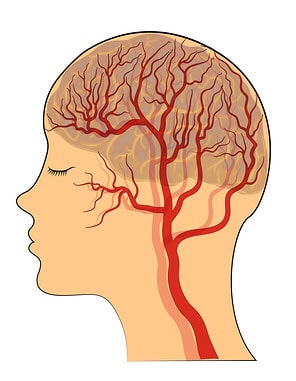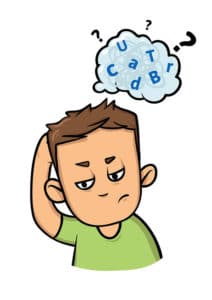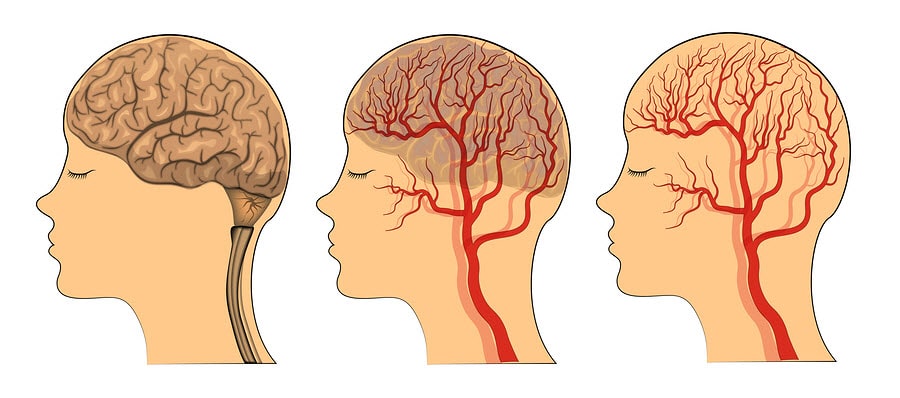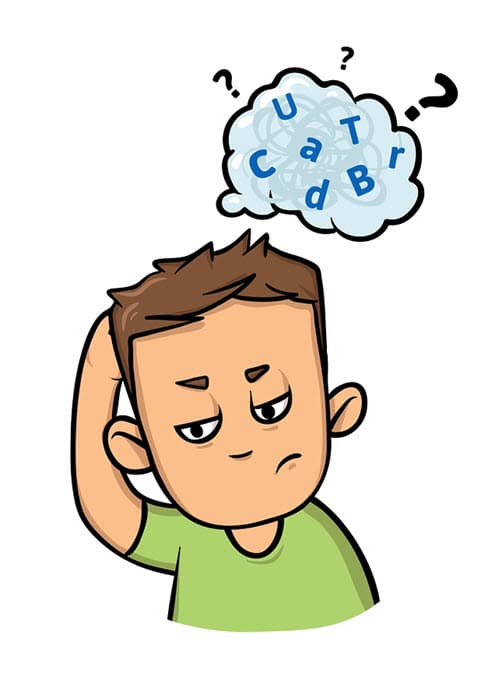Table of Contents
I’ve been asked by Nootropics Expert® readers to write about a “Leaky Blood-Brain Barrier”. And the question naturally is what nootropics to use if you suspect you have a leaky brain. You’ll find the answers in this post.
Most of us are aware of “leaky gut” syndrome. It’s long been associated with Celiac disease and Crohn’s disease.
And increased interest in gluten sensitivity has led to food labels featuring ‘gluten free’ and gluten-free products in nearly every category of food you can think of in our supermarkets.[i]
This is a bigger deal than what most people think. The National Institute of Health reports that close to 20% of Americans suffer from a diagnosable mental disorder.[ii]
And serious mental illness causes $193.2 billion in lost earnings each year.
The same report says that depression and anxiety disorders cost the global economy $1 trillion in lost productivity each year. And depression is the leading cause of disability worldwide.
The thing is even if you can name the “diagnosable” mental health disorder, doctors often don’t know the cause.
So you end up with a prescription for some med that doesn’t work. Or it does work but the side effects are horrendous.
Turns out the cause may be a ‘leaky blood-brain barrier’. And if you have a leaky gut, chances are high that you’re dealing with a leaking brain too.
In this post you’ll find natural options for healing a leaky brain.
What is the Blood-Brain Barrier?
Your brain is protected by a 7 mm thick skull. And is surrounded by cerebrospinal fluid along with a protective membrane called the meninges. This is your primary defense against physical injury like a whack on the head.
 Your next layer of brain defense is your blood-brain barrier. This is a barrier between your brain’s blood vessels (capillaries) and brain cells and other tissues that make up your brain.
Your next layer of brain defense is your blood-brain barrier. This is a barrier between your brain’s blood vessels (capillaries) and brain cells and other tissues that make up your brain.
Its purpose is to tightly regulate the movement of ions, neurotransmitters, and other molecules between your general blood supply and your brain.
This precise control of your brain transports oxygen and nutrients to brain tissues while removing carbon dioxide and other waste.
It also promotes normal hormone and neurotransmitter signaling. And maintains control of the interaction between your brain and the rest of your body.
This allows optimal brain function while protecting your brain tissues from toxins, pathogens and other nasty stuff circulating in your general blood supply.
The Mechanics of your Blood-Brain Barrier
Endothelial cells line the interior of all your blood vessels. But in your brain, the Endothelial cells lining the inside of capillaries are held tightly and sealed together by ‘tight junctions’.[iii]
 Tight junctions are made up of a network of claudins and cytoplasmic proteins, such as zonula occludens (ZO), and cingulin.[iv]
Tight junctions are made up of a network of claudins and cytoplasmic proteins, such as zonula occludens (ZO), and cingulin.[iv]
But your blood-brain barrier is not just surrounding and encasing your brain in a protective layer. This network of capillaries goes throughout most of your brain. And no brain cell is ever further than ~25 μm (micrometer) from a capillary.[v]
The thing is your blood-brain barrier is more than just a firewall protecting your brain.
Capillaries in select brain regions facilitate the passage of glucose and amino acids across your blood-brain barrier via carriers specific to that molecule.
This highly dynamic layer of cells works with transporters that allow oxygen, certain cytokines, hormones and some neurotransmitters that your brain requires to function.[vi]
The bottom-line is a healthy blood-brain barrier is your last line of defense keeping bad things out of your brain. And allowing the good stuff through.
But a leaky blood-brain barrier, just like a leaky gut, can lead to a whole host of problems.
Signs you may have a “Leaky Brain”
 I’ve written about the causes of brain fog, memory loss, chronic fatigue, anxiety, and depression. And how each of these can often be corrected with nootropic supplements.
I’ve written about the causes of brain fog, memory loss, chronic fatigue, anxiety, and depression. And how each of these can often be corrected with nootropic supplements.
But if you’ve tried my suggested nootropic stacks in the past for each of these issues and nothing has worked. It could be a leaky blood-brain barrier.
Because clinical studies show that a leaky blood-brain barrier can be the cause of brain fog, cognitive dysfunction, chronic fatigue, anxiety, and depression.[vii]
And if you’re dealing with a leaky gut, chances are you’re suffering from a leaky blood-brain barrier as well.[viii]
A classic example of this is Celiac disease. If you’re dealing with Celiac disease chances are, you’re also suffering from seizures, headache, cognitive impairment, or other psychiatric disease.[ix]
What causes a leaky brain?
I have touched in the past on ‘leaky gut syndrome’ when writing about Psychobiotics and your gut-brain connection.
Recent research shows that a leaky gut is often associated with a ‘leaky brain’.[x]
Elevated antibodies
 The proteins claudin, occludin, and zona occluden proteins (ZO-1, ZO-2, and ZO-3) are required for the integrity of the tight junctions in your gut barrier lining, and a healthy blood-brain barrier.
The proteins claudin, occludin, and zona occluden proteins (ZO-1, ZO-2, and ZO-3) are required for the integrity of the tight junctions in your gut barrier lining, and a healthy blood-brain barrier.
Problems start with elevated antibodies against occludin and zonulin. Which often leads to leaky brain syndrome.
Lab work can determine if you have elevated levels of antibodies against occludin and zonulin. Blood tests can measure antibodies against these two proteins. Because it it’s left unchecked, tight junctions that seal your gut- and blood-brain barrier are compromised. Resulting in brain and gut permeability.
Inflammation
Research also shows that microRNAs (specifically microRNA-155) are key regulators in inflammation and blood-brain barrier permeability.[xi]
When inflammation goes up, your blood-brain barrier breaks down. And let’s nasty stuff into your brain. Resulting in damaged neurons and a “self-propelling cycle of neuron death.”[xii]
This area of neuroscience has come to be known as the “cytokine model of cognitive function.”[xiii] Elevated proinflammatory cytokines often result in brain inflammation which can lead to anxiety, depression, brain fog, and other autoimmune brain problems.[xiv]
There’s even a “cytokine hypothesis of depression”.[xv]
The bottom-line is inflammation can be the cause of your anxiety, depression, brain fog or some other cognition issue.
If you’ve tried nootropics or meds and have not experienced any relief, it could be inflammation and a leaky blood-brain barrier that is causing your symptoms.
Homocysteine
High homocysteine levels have been linked to a damaged blood-brain barrier.[xvi] Get your homocysteine levels checked the next time you get your labs done.
Blood sugar
High blood sugar is also a risk factor for developing a leaky blood-brain barrier.[xvii] Get your labs done for fasting blood sugar and Hgb A1C to find out if you’re blood sugar levels are high.
Bacterial overgrowth
We’ve touched on the gut-brain axis earlier. And with these two linked, it makes sense that a bacterial imbalance and Candida overgrowth in your gut can result in cognition problems and even depression or anxiety.
When Candida gets out of control, it creates a layer in your intestines. Which suppresses the production of neurotransmitters like serotonin.
Antibiotics are often prescribed to treat Candida overgrowth and other bacterial infections. Often leading to yeast overgrowth.
If you find that Candida is out of control, your first option is to eliminate sugar of all forms including desserts, candy, alcohol, and flour. And cut back on refined grains, beans, bread, pasta, white potatoes, and fermented foods.

Best nootropics to fix a leaky blood-brain barrier
If you’re dealing with a leaky blood-brain barrier, nootropics can help tame inflammation and restore the integrity of the tight junctions needed for a healthy blood-brain barrier.
The following nootropic supplements have been clinically proven to help tame inflammation and heal a leaky blood-brain barrier.
You can safely use ALL the nootropics I’ve detailed below in a single nootropic stack at the recommended dosages.
NOTE: each nootropic below contains a live link that will take you to my full review of that supplement. Which includes what it is, where it comes from, why we use it, how it works in your brain, clinical studies, dosage recommendations, side effects and forms or type of supplement to buy.
Berberine – 500 mg 3-times per day
Berberine is a bright yellow alkaloid extracted from plants such as Indian Barberry (tree turmeric), Oregon Grape and goldenseal.
Berberine has been used for thousands of years as treatment for bacterial infections, fungus, protozoa, viruses, chlamydia and candida. It helps protect against cholera and E coli. It is used as an anti-diarrheal, and to reduce inflammation.
As a nootropic, Berberine increases cholinergic activity, restores Brain-Derived Neurotrophic Factor (BDNF), and cAMP-response element-binding protein and mRNA expression in your hippocampus.
Berberine also decreases proinflammatory cytokines like interleukin-1β, tumor necrosis factor-α and cyclooxygenase-2 mRNA in the hippocampus.[xviii]
Studies show that Berberine can also reduce the permeability of a leaky blood-brain barrier. Primarily by reducing inflammation.[xix] [xx]
Caffeine – up to 200 – 400 mg per day
Caffeine is an adenosine antagonist which influences acetylcholine, epinephrine (adrenaline), serotonin and boosts the use of dopamine. Providing the stimulant effect, you get when consuming caffeine.[xxi]
Caffeine also provides a protective effect by boosting gene expression of brain-derived neurotrophic factor (BDNF).
Studies show that caffeine blocks increase in IgG and fibrinogen and decreases in tight junction proteins occludin and ZO-1, increases in astrocytes activation and microglia density where IgG leakage was present. Protecting the integrity of the blood-brain barrier.[xxii]
Curcumin extract (95% curcuminoids) 750 mg 3-times per day
Curcumin is the primary active compound in Turmeric. And research shows curcumin boosts neurogenesis. More neurons mean better learning, memory, and mood.[xxiii]
Curcumin is also a potent antioxidant and helps protect your brain from inflammation.
A study at China Medical University found that Curcumin helps prevent disruption of the blood-brain barrier after a stroke.
The researchers found that Curcumin restored the expression of occludin and ZO-1 proteins which in turn restored the barrier function of the blood-brain barrier.[xxiv]
DHA (Omega-3) – 1,000 mg per day
DHA is an Omega-3 fatty acid which makes up much of the gray matter in your brain. Your brain is about 60% fat. And much of that fat is DHA. It’s a critical part of healthy and fluid brain cell membranes.
DHA can boost brain-derived neurotrophic factor (BDNF), regulate calcium oscillations which are involved in neurotransmitter release, boost mitochondrial function, gene activation, oxidative stress, and reduce inflammatory COX-2 enzymes.
Research also shows that DHA can reduce blood-brain barrier damage after a stroke[xxv], after traumatic brain injury[xxvi], and help repair a leaky brain in multiple sclerosis (MS) patients.[xxvii]
L-Glutamine – 2 – 5 grams per day
L-Glutamine is an essential amino acid and precursor for the synthesis of glutamate.
We use L-Glutamine to treat a leaky blood-brain barrier because it helps boost your body’s immune response. It increases antibodies to fight against viruses and harmful bacteria.
L-Glutamine also helps tame inflammatory cytokines which can be harmful to tight junctions needed to keep your blood-brain barrier healthy.
And it detoxes your brain from excess ammonia by converting it into other amino acids, sugars, and urea.
Magnesium – 400 mg before bed
Magnesium deficiency is nearly epidemic in our society because it is sorely lacking in our food supply.[xxviii]
The thing is magnesium is the 4th most abundant mineral in your body. And is a cofactor in more than 600 enzymatic reactions.
You need magnesium to produce adenosine triphosphate (ATP) which is your primary source of energy. Magnesium is required for the synthesis of RNA and DNA[xxix], and regulates ion channels which govern the flow of neurotransmitters.
One animal study showed magnesium reduced blood-brain barrier permeability caused by sepsis.[xxx]
Another study showed magnesium supplementation reduced blood-brain barrier permeability caused by high blood pressure.[xxxi]
And yet another showed magnesium prevented blood-brain barrier breakdown after traumatic brain injury.[xxxii]
Resveratrol – 250 mg per day
Resveratrol is a naturally-derived polyphenol antioxidant used to protect your brain from oxidative stress.
It increases cerebral blood flow, boosts BDNF, protects mitochondria, and prevents the release of toxic glutamate during a stroke.[xxxiii]
One study had 19 Alzheimer’s patients take 1,000 mg of Resveratrol daily for one year. The study found it reduced matrix metalloproteinase-9 (MMP-9) levels in the cerebrospinal fluid by 50%. This MMP-9 decreased when sirtuin1 (SIRT1) is activated.[xxxiv]
High levels of MMP-9 weaken the tight junction of the blood-brain barrier. Conversely, low levels of MMP-9 help maintain a healthy blood-brain barrier.
Another study showed Resveratrol decreased nuclear factor kappaB (NF-κB) and the increased Claudin-5 which strengthened the integrity of tight junctions in the blood-brain barrier.[xxxv]
Vitamin D3 – 4,000 IU’s per day
Vitamin D3, the “sunshine vitamin”, as a nootropic supplement is critical for optimal cognitive health.
It’s an integral part of neurotransmitter synthesis, gene expression, DNA maintenance and repair, and the forms of neuroplasticity needed for memory formation and retrieval.
But Vitamin D deficiency (hypovitaminosis D) is an undeclared worldwide pandemic affecting nearly 50% of the population on this planet.
Research shows that Vitamin D helps maintain blood-brain barrier integrity by blocking the increased production of reactive oxygen species (ROS), and nuclear factor kappa B (NF- kB) activation. And increases levels of the tight junction proteins occludin, claudin-5 and ZO-1.[xxxvi]
And another animal study showed Vitamin D supplementation reduced blood-brain barrier permeability.[xxxvii]
Several of the B-Vitamins have been clinically shown to help prevent a leaky brain and support the blood-brain barrier.
Vitamin B1 (thiamine) – Thiamine is a required cofactor in the synthesis of acetylcholine, is part of the KREBs cycle that produces adenosine triphosphate (ATP), is needed for the synthesis of myelin, and helps maintain optimal levels of glutamate and GABA.
Thiamine deficiency can be caused by alcoholism, Alzheimer’s Disease, anemia, athletes who reduce food intake, cancer, clogged arteries, Crohn’s disease, diabetes, diarrhea, gastric bypass surgery, consuming large amounts of coffee and tea, and kidney disease. And even a poor diet.
Severe thiamine deficiency (Wernicke encephalopathy) causes damage to the integrity of the blood-brain barrier. Which can quickly be reversed with one week of thiamine supplementation. [xxxviii]
Vitamins B6, B9 & B12 – work together to keep homocysteine levels in check.
Homocysteine is an inflammatory compound and when levels are excessively high can break the integrity of the blood-brain barrier.
Studies show that supplementing with B6, B9 & B12 will bring homocysteine levels down to normal levels and restore the integrity of the blood-brain barrier.[xxxix]
Leaky Brain Summary
We’ve defined what the blood-brain barrier is and why it’s so critical to your overall cognitive health.
We looked at the causes of a leaky blood-brain barrier. And how to fix it.
We also discovered that if you’ve got a leaky gut, chances are your brain is leaky too. If you fix one, you’ll make great strides in fixing the other.
All the nootropics I’ve detailed above can be used daily as a single nootropic stack if you’re dealing with a leaky brain. Just follow the dosage recommendations and you should be fine.
If this is your first time using any of the above supplements, start with one at a time. Use it for a day or two. And if you don’t experience any problems. Add the next on the list.
Heal your leaky brain naturally and watch the symptoms of brain fog, memory loss, chronic fatigue, anxiety, and depression get less and less over time.








Join The Discussion - 42 comments
Ally
August 26, 2024
Hi David
Love your work, long time follower, first time commenter. I have just been dx with an aneurysm. I don’t want to waste your time with my story, happy to have a consult if you have specific knowledge that might be of help to me. I know you have extensive knowledge of the neuro area so just wanted to know if you think it would be worthwhile. Either way thanks for your rigorous and well-presented synthesis of vast amounts of info for the benefit of many 🙂
David Tomen
August 26, 2024
Ally, I have done consultations with people dealing with stroke and do have a list of supplements that I have found that may help you. The science is sound and it’s real. I’d be happy to work with you when you are ready.
Ally
August 27, 2024
Hi David, that’s awesome, I want to try and prevent the stroke! I haven’t seen a specialist yet, I will do that and then be in touch 🙂